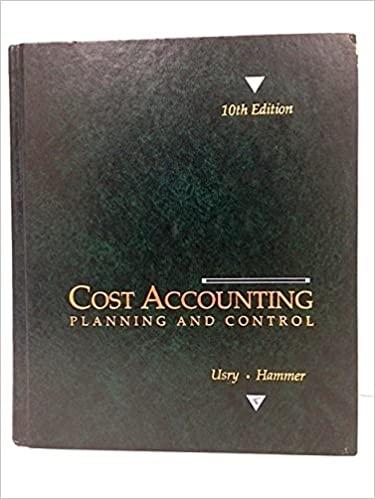Question
Chapter 3, P 2. P2. On November 30, the end of the current fiscal year, the following information is available to assist Allerton Corporation's accountants
| Chapter 3, P 2. | |||||||||||||||||||||
| P2. On November 30, the end of the current fiscal year, the following information is available to assist Allerton Corporation's accountants in making adjusting entries: a. Allerton's SUpplies account shows a beginning balance of $2,350. Purchases during the year were $4,218. The end-of-year inventory reveals suppleis on hand of $1,397. b. The Prepaid Insurance account shows the following on November 30: Beginning balance $4,270 July 1 4,200 October 1 7,272 The beginning balance represents the unexpired portion of a one-year policy purchased in September of the previous year. The July 1 entry represents a new one-year policy, and the October 1 entry represents additional coverage in the form of a three-year policy. c. The following table contains the cost and annual depreciation for buildings and equipment, all of which Allerton purchased before the current year: Account Cost Annual Depreciation Buildings $298,000 $16,000 Equipment 374,000 40,000 d. On October 1, the company completed negotations with a client and accepted an advance of the $18,600 was credited to Unearned Services Revenue. e. The company caluclated that, as of November 30, it had earned $7,000 on an $11,000 contract that would be completed and billed in January. f. Among the liabilities of the company is a note payable in the amount of $300,000. On November 30, the accrued interest on this note amounted to $18,000. g. On Saturday, December 2, the company, which is on a six-day workweek, will pay its regular employees their weekly wages of $15,000. h. On November 29, the company completed negotiations and signed a contract to provide services to a new client at an annual rate of $23,000. i. Management estimates income taxes for the year to be $22,000. Required. 1. Prepare adjusting entries for each item listed above. 2. Concept - Explain how the conditions for revenue recognition are applied to transactions e and h. | |||||||||||||||||||||
| 1. | Adjusting entries recorded | ||||||||||||||||||||
| a. | Nov. | 30 | Supplies Expense | 5,171 | |||||||||||||||||
| Supplies | 5,171 | ||||||||||||||||||||
| To record supplies used | |||||||||||||||||||||
| $2,350 | + | $4,218 | $1,397 | ||||||||||||||||||
| = | $5,171 | ||||||||||||||||||||
| b. | 30 | Insurance Expense | 6,874 | ||||||||||||||||||
| Prepaid Insurance | 6,874 | ||||||||||||||||||||
| To record expired insurance | |||||||||||||||||||||
| $4,720 | |||||||||||||||||||||
| 1,750 | [ ( | $4,200 | 12 | months ) | |||||||||||||||||
| x | 5 | months ] | |||||||||||||||||||
| 404 | [ ( | $7,272 | 36 | months ) | |||||||||||||||||
| x | 2 | months ] | |||||||||||||||||||
| $6,874 | |||||||||||||||||||||
| c. | 30 | Depreciation ExpenseBuildings | 16,000 | ||||||||||||||||||
| Depreciation ExpenseEquipment | 40,000 | ||||||||||||||||||||
| Accumulated DepreciationBuildings | 16,000 | ||||||||||||||||||||
| Accumulated DepreciationEquipment | 40,000 | ||||||||||||||||||||
| To record annual depreciation | |||||||||||||||||||||
| d. | 30 | Unearned Service Revenue | 4,650 | ||||||||||||||||||
| Service Revenue | 4,650 | ||||||||||||||||||||
| To record service revenue earned on | |||||||||||||||||||||
| services collected in advance | |||||||||||||||||||||
| ( | $18,600 | 12 | months ) | ||||||||||||||||||
| x | 3 | months = | $4,650 | ||||||||||||||||||
| e. | 30 | Accounts Receivable | 7,000 | ||||||||||||||||||
| Service Revenue | 7,000 | ||||||||||||||||||||
| To record service revenue earned on | |||||||||||||||||||||
| a contract to be billed in January | |||||||||||||||||||||
| f. | 30 | Interest Expense | 18,000 | ||||||||||||||||||
| Interest Payable | 18,000 | ||||||||||||||||||||
| To record accrued interest on note | |||||||||||||||||||||
| payable | |||||||||||||||||||||
| Chapter 3, P 2. (Continued) | |||||||||||||||||||
| g. | Nov. | 30 | Salaries Expense | 10,000 | |||||||||||||||
| Salaries Payable | 10,000 | ||||||||||||||||||
| To record accrued salaries | |||||||||||||||||||
| ( | $15,000 | 6 | days ) x | 4 | days | ||||||||||||||
| = | $10,000 | ||||||||||||||||||
| h. | No entry | ||||||||||||||||||
| i. | 30 | Income Taxes Expense | 23,000 | ||||||||||||||||
| Income Taxes Payable | 23,000 | ||||||||||||||||||
| To accrue estimated income taxes | |||||||||||||||||||
| for the year | |||||||||||||||||||
| 2. | User Insight: Revenue recognition discussed | ||||||||||||||||||
| In transaction "e," $7,000 has to be recognized as revenue because services have | |||||||||||||||||||
| already been provided and there is an obligation to pay for them. In transaction | |||||||||||||||||||
| "h," November 29 is not a recognition point because no services have been pro- | |||||||||||||||||||
| vided and there is no obligation to pay for them. For each of the adjusting entries listed in the Posted Solution, explain why it is necessary and whether it increases or decreases financial position and whether it increases or decreases profitability (also called performance). | |||||||||||||||||||
Step by Step Solution
There are 3 Steps involved in it
Step: 1

Get Instant Access to Expert-Tailored Solutions
See step-by-step solutions with expert insights and AI powered tools for academic success
Step: 2

Step: 3

Ace Your Homework with AI
Get the answers you need in no time with our AI-driven, step-by-step assistance
Get Started


